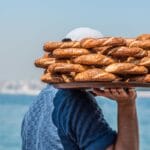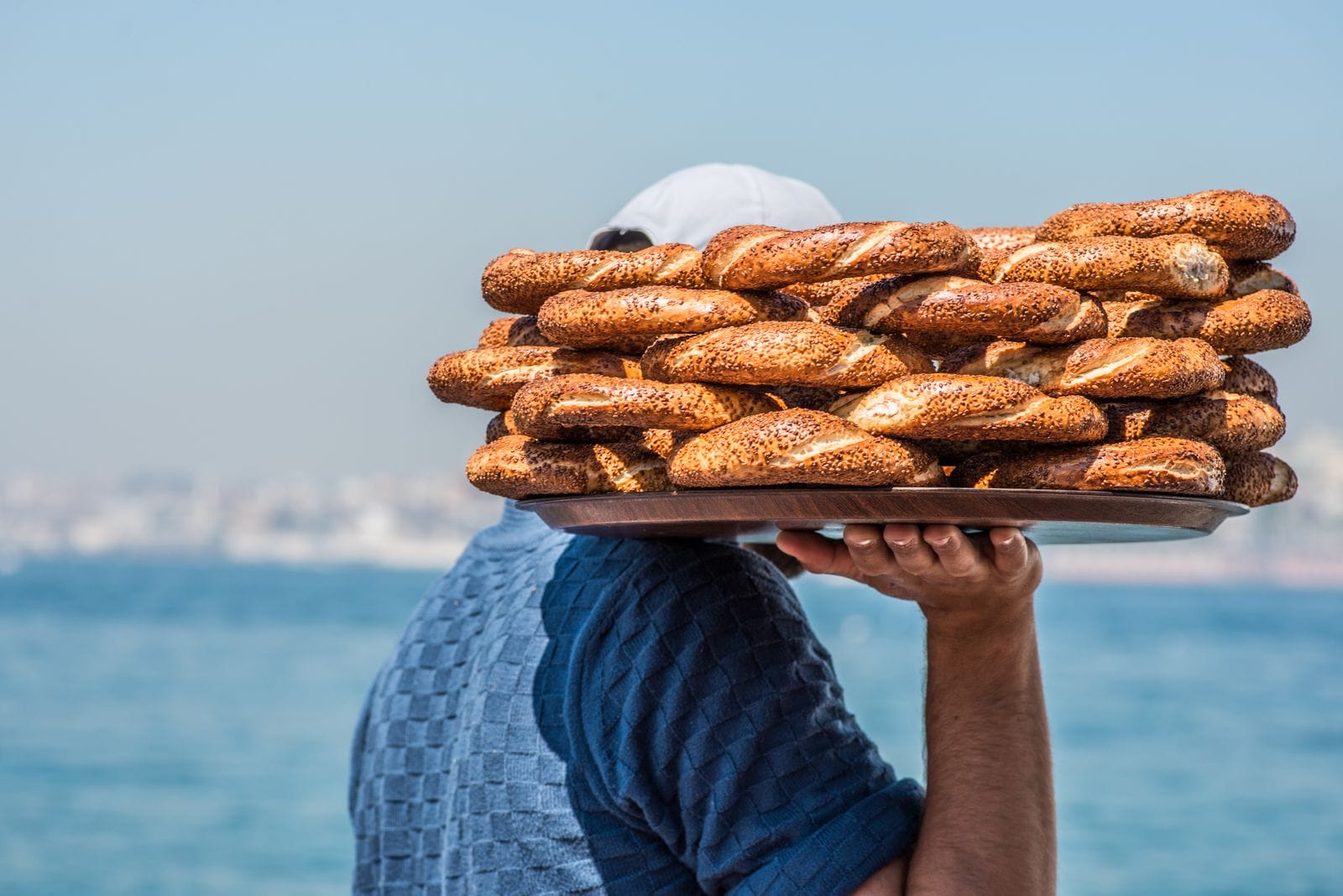The balık ekmek (fish sandwich or, more literally, fish and bread) – an Istanbul street food staple – has lived and died and been born again along any walkable stretch of the Bosphorus. Whether you’re in the habit of buying it from the neon-lit boats docked at Eminönü’s pier (which, to the chagrin of some and the delight of others, had their leases revoked by the municipality on November 1) or from a street cart illuminated by a jaundiced bare bulb, one thing’s for certain: there’s a better option out there.
That would be the balık dürüm (fish wrap) – the fish sandwich’s tastier, spicier and genuinely sexier cousin. In an ever-developing city where centuries-old institutions are taking their final breaths, there is much change to lament. But the introduction of the balık dürüm is one change we welcome with open arms and mouths.
Our first memory of the balık dürüm is five years old, back when we would delight in taking visitors to the Karaköy sahil (seaside), adjacent to Perşembe Pazarı and Turyol dock, with its endless stream of unrushed commuters and screeching seagulls chasing ferries. There, you could order a fish sandwich from one of the grillers posted up by the water (even then we’d long-been eschewing the drab balık ekmek of Eminönü), grab a low plastic stool and watch the city lights flicker on across the Golden Horn as the call to prayer heralded the start of dusk, Istanbul’s most beautiful face. Those in the know could ask a particular few of these grillers for your sandwich in dürüm-form, substituting the dry bread with a thin, pre-packaged lavaș (a flour tortilla-like flatbread) for an extra 2 TL.

One such griller is Mehmet usta, of the eponymous Balık Dürüm Mehmet Usta, who now runs a proper storefront on the at-once hip and traditional Mumhane Caddesi, on Karaköy’s opposite bank. Compared to the fish sandwich meals you’ll find elsewhere, where the sellers merely slap an uskumru (mackerel) fillet into half a loaf and toss in some watery lettuce and tasteless onion, Mehmet usta and his family, who all hail from Turkey’s eastern Diyarbakır province, rapidly pluck out the tiny bones of the mackerel as it cooks, releasing the tender, fatty meat from its grilled skin and allowing their special blend of spices to penetrate the newly formed chunks.
In 2016, Mehmet usta and his relatives opened their modest shop after a bit of moving around. “I used to be located down a small alley, not too far from here. You’d think it would be a bad place for business, but you know how people would find me?” he asks. “With their taste buds.” He’s rather on the nose, as that’s how we sought him out upon hearing he and his fellow balık ekmekçiler (fish sandwich grillers) had been kicked off the Karaköy sahil.
Since two large development companies – Doğuş Group and Bilgili Holding – won the privatization tender for the ultra-luxe Galataport construction in 2013, the mention of Karaköy, a former dockside neighborhood where folks would go to buy hardware, comes with groans and shrugs. To the left and right of Galata Bridge, both ends of Karaköy have been fraught with either construction projects, breakneck gentrification or both. In 2015, the government pushed out the numerous pop-up businesses (including our grillers) hugging the water so that they could reconstruct the fish market and install a pedestrian-friendly boardwalk and park. The move was met with anger and frustration from residents who were witnessing another stretch of the Bosphorus being closed off to make way for seemingly endless development, though many local (and legal) businesses were glad to see the illegal cafés given the boot. The boardwalk is now mostly complete, and the fish market and a handful of former operations have opened back up, this time with the correct permits (and, of course, a price increase).

One such establishment, Emin usta, we wrote about in 2014. Mehmet usta drops his name as we chat. “I wasn’t the first to do the dürüm,” he concedes, telling us that this particular bit of culinary genius belongs to Emin usta, who, thanks to his distinctive mustache, is now officially operating under the nickname Super Mario a little back from the Karaköy sahil. “But my feeling is, if you’re going to do dürüm, you have got to do it like this,” Mehmet usta says, pointing to his grill.
He generously takes from the array of spices laid out beside the cooktop and sprinkles them over the sizzling fish. “My specialty is taste,” he says. Each morning, the family prepares a fresh batch of their spice blend and, like any good cook in Istanbul, Mehmet usta doesn’t reveal exactly what’s in it. (Though he does insist to our doubting ears that there’s a hint of walnut, hazelnut and pumpkin seed.) He pauses to rub some more of the spices into the lavaș as well, a touch that we love, then turns to look at us. “For me, fish is like kebab,” he says – and we finally connect the dots. All this time we’d been comparing his fish wrap to the traditional balık ekmek when, in fact, it is more akin to another Turkish classic: the Adana dürüm. It’s skewered minced-meat cooked on a charcoal grill, seasoned with salt, sumac and cumin, spicy, tender and full of flavor.
As we talk, the family members trade off behind the grill, each quickly but painstakingly removing the bones from a fish they’ve just tossed on. They go through 40 kilos of uskumru a day, and the fish comes to Mehmet usta frozen via the fish market in Istanbul’s Silivri district. Uskumru, which is used in all fish sandwiches, makes for a juicer, if fishier, filling. This makes Mehmet usta’s use of spices key, something you won’t find in a traditional balık ekmek. Another bit of flair he adds to his wraps is seasonal produce, be they carrots and turnips in the fall or pomegranate seeds in winter. Always on hand are grilled red peppers and onions as well as fresh lettuce, and various mystery sauces, including pomegranate molasses to pour over everything before wrapping it all up.
When asked what he enjoys about his craft, he simply says: “balık, yani.” I mean, the fish.
Six more orders have just come in, on top of our two. One of our party eats gluten-free, and Mehmet usta was happy to grill up one of the flatbreads she brought with her. Another customer has asked for a sandwich over the dürüm, a rare occurrence, but Mehmet usta pulls out a compact loaf of odun ekmeği (oven bread), the crusty white bread typically used to make balık ekmek. He says he gets both this and the lavaș from a local bakery every morning.

“I just like being here behind the grill, in my shirt and apron,” he says. He’s a man of few words, preferring to let his relatives interact with customers. And when asked what he enjoys about his craft, he simply says: “balık, yani.” I mean, the fish.
“I eat it every day,” he says. “I’m happy with that.”
“Really, he does. Every day,” Mehmet’s brother-in-law and partner, Veysi Kaplan, chimes in, his eyes steady on his work as he fillets another mackerel.
Published on November 04, 2019
Related stories
February 28, 2024
Food Tours NDQuick Bite: This full-day Istanbul market tour draws from our best-of list in the European side’s Karaköy neighborhood and the Asian Kadıköy, tied together by a Bosphorus crossing, visiting two markets on two continents. Our favorite Istanbul experiences include exploring the eateries in local markets and crossing the Bosphorus on the public ferry. The route for…
August 19, 2021
IstanbulOutside of Kristal Ocakbaşı, a small grill joint tucked away on a side street in the Pangaltı neighborhood, Obama sat greeting the regulars who streamed in to watch a soccer game while feasting on kebab. “What’s the news, Obama?” asked one man with shoulder-length white hair. “Selam aleykum, Obama,” said another. One woman patted him…
December 12, 2019
IstanbulOn a blustery, drizzly winter afternoon in Istanbul, Muhittin Öztürk swipes his cell phone until he finds the photo he’s looking for: three men clad in blue aprons, standing behind a grill inside a small fishing boat. “That one’s my father, that one’s my uncle,” Öztürk says, pointing at the image. “This is the culture…




















































































